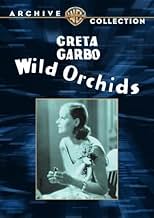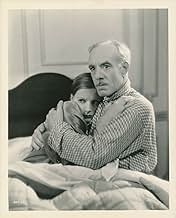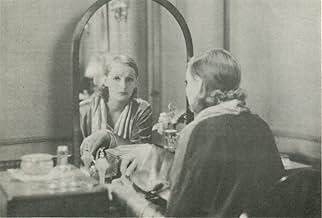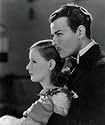A prince in Java tries to seduce his visitor's wife, but he's discovered.A prince in Java tries to seduce his visitor's wife, but he's discovered.A prince in Java tries to seduce his visitor's wife, but he's discovered.
- Awards
- 3 wins total
6.4798
1
2
3
4
5
6
7
8
9
10
Featured reviews
Betrayal From the East
WILD ORCHIDS (Metro-Goldwyn-Mayer, 1929), directed by Sidney Franklin, stars Greta Garbo in her second of four releases for that year (a busy one for the Swedish sphinx). It returns her to familiar territory about a love triangle set in far away Java ("A land of magic beauty - cursed with heat - relentless heat"). With Garbo pitted between two male co-stars, Lewis Stone (white hair, dark mustache) and Nils Asther (dark exotic features and mustache) who happen to be the only performers credited in the cast, while others, whether acting as chauffeur, steward or Javanese servants, their roles go without billing. Released minus spoken dialog from its principal players, WILD ORCHIDS, filmed in late silent film tradition, contains some spoken words ("Goodbye") from crowded extras during its opening scene at the dock, ("Don't forget to write") from another, off-screen vocalizing to the theme song, "You Are Like Wild Orchids," sound effects and grunting sounds of dancing natives, and of course the roaring of the MGM lion on the logo during its fade-in. As for the film itself, this has the possibilities of a fine early talkie, but as it stands, Garbo was to remain silent for another year on screen.
The photoplay centers upon a young woman named Lillie (Greta Garbo) who accompanies John Sterling (Lewis Stone), her middle-aged business-minded husband on a ship bound for the Orients where he's assigned to inspect plantations in Java. As Lillie heads over towards the dock so she could have one last look at San Francisco, down the hallway she witnesses the whipping by fellow passenger, the exotic Prince De Gac (Nils Asther) on his unfortunate servant outside his cabin. Seeing his brutal measures witnessed by an attractive woman, De Gace ceases as she passes him in disgust. Unable to get the woman out of his mind, the prince gets through to her by becoming acquainted with her husband by discussing business that eventually has him inviting the Sterlings as his personal guests in his luxurious palace East of Java. In spite of her pleas not to go, John agrees on the invitation so he and the Prince can go hunting tigers together. When John discovers the Prince is interested in making advances on wife, he then has more than tiger hunting on his mind.
While not up to Garbo's earlier successes, namely FLESH AND THE DEVIL (1927), WILD ORCHIDS is at times satisfactory but suffers from over length of mediocre sequences such as the "King and I" type gathering at the palace dining room where the Sterlings are entertained by group of sword dancing natives, though repetitious love scenes between Garbo and Asther with possibilities of getting caught in the act by the husband do add to some suspense. With the first half hour taking place on a luxury liner, the duration of the story giving viewers an eyeful of its luxurious Java estate, lavish sets, large stairways, and revealing fashions from Garbo's 1920s attire (even letting her hair down looking as she did in her films of the 1930s) to something more exotic to impress her husband, who, in turn tells her to "take off that junk!" Though the plot is slow going at times, it picks up again following a promising opening to its near climax that parallels FLESH AND THE DEVIL as wife rushes out to prevent the possible fatal showdown between the men in her life.
Considering WILD ORCHIDS is an unfamiliar Garbo film in itself, or MGM's for that matter, it did become Garbo's first film from the silent era to be distributed on tape enclosed in plastic clam shell and yellow cover in 1985 through MGM/UA Home Video. The video print, at 119 minutes, is 20 minutes longer than the 100 minute presentation on Turner Classic Movies, which might indicate correct silent film projection speed transferred on video, or trimmed scenes or shorter reissue prints acquired on cable television. Overall, a worthy rediscovery of a motion picture produced during the dawn of sound with actors doing their all by holding audience attention, whether through illicit affairs or hunting tigers, though none actually acquire any wild orchids in the moonlight. (**)
The photoplay centers upon a young woman named Lillie (Greta Garbo) who accompanies John Sterling (Lewis Stone), her middle-aged business-minded husband on a ship bound for the Orients where he's assigned to inspect plantations in Java. As Lillie heads over towards the dock so she could have one last look at San Francisco, down the hallway she witnesses the whipping by fellow passenger, the exotic Prince De Gac (Nils Asther) on his unfortunate servant outside his cabin. Seeing his brutal measures witnessed by an attractive woman, De Gace ceases as she passes him in disgust. Unable to get the woman out of his mind, the prince gets through to her by becoming acquainted with her husband by discussing business that eventually has him inviting the Sterlings as his personal guests in his luxurious palace East of Java. In spite of her pleas not to go, John agrees on the invitation so he and the Prince can go hunting tigers together. When John discovers the Prince is interested in making advances on wife, he then has more than tiger hunting on his mind.
While not up to Garbo's earlier successes, namely FLESH AND THE DEVIL (1927), WILD ORCHIDS is at times satisfactory but suffers from over length of mediocre sequences such as the "King and I" type gathering at the palace dining room where the Sterlings are entertained by group of sword dancing natives, though repetitious love scenes between Garbo and Asther with possibilities of getting caught in the act by the husband do add to some suspense. With the first half hour taking place on a luxury liner, the duration of the story giving viewers an eyeful of its luxurious Java estate, lavish sets, large stairways, and revealing fashions from Garbo's 1920s attire (even letting her hair down looking as she did in her films of the 1930s) to something more exotic to impress her husband, who, in turn tells her to "take off that junk!" Though the plot is slow going at times, it picks up again following a promising opening to its near climax that parallels FLESH AND THE DEVIL as wife rushes out to prevent the possible fatal showdown between the men in her life.
Considering WILD ORCHIDS is an unfamiliar Garbo film in itself, or MGM's for that matter, it did become Garbo's first film from the silent era to be distributed on tape enclosed in plastic clam shell and yellow cover in 1985 through MGM/UA Home Video. The video print, at 119 minutes, is 20 minutes longer than the 100 minute presentation on Turner Classic Movies, which might indicate correct silent film projection speed transferred on video, or trimmed scenes or shorter reissue prints acquired on cable television. Overall, a worthy rediscovery of a motion picture produced during the dawn of sound with actors doing their all by holding audience attention, whether through illicit affairs or hunting tigers, though none actually acquire any wild orchids in the moonlight. (**)
Garbo excels in exotic love triangle romance...no spoken dialog...
Although there is a fine background score and many sound effects throughout, neither GRETA GARBO, LEWIS STONE nor NILS ASTHER speak a word of dialog in this MGM film directed by Sidney Franklin during the dawn of sound films.
With the use of the usual title cards for the spoken words and some excellent emoting from the three stars, the viewer becomes absorbed in what is essentially a handsomely produced love triangle set aboard a cruise ship heading for Java. Even as early as 1929, MGM's glossy production values are evident.
Garbo is the restless wife of the middle-aged Lewis Stone when she first sets eyes on princely Nils Esther aboard ship, fascinated as she watches him brutally whip a slave. When fascination turns to disgust, she rebuffs his advances when he has an opportunity in Java to be alone with her while her husband goes on a hunting trip. Predictably, she is soon under his spell and that's when the plot begins to turn.
Stone is adept at portraying the husband's emotions when he believes his wife unfaithful and Nils Asther is so perfectly cast that I wish he'd made more American films in the future rather than return to his native Sweden. As for Garbo, she has never looked more beautiful nor more youthful before her features matured.
Although the plot is a simple one, there's enough interest in the trio to assure attention until the final shot.
With the use of the usual title cards for the spoken words and some excellent emoting from the three stars, the viewer becomes absorbed in what is essentially a handsomely produced love triangle set aboard a cruise ship heading for Java. Even as early as 1929, MGM's glossy production values are evident.
Garbo is the restless wife of the middle-aged Lewis Stone when she first sets eyes on princely Nils Esther aboard ship, fascinated as she watches him brutally whip a slave. When fascination turns to disgust, she rebuffs his advances when he has an opportunity in Java to be alone with her while her husband goes on a hunting trip. Predictably, she is soon under his spell and that's when the plot begins to turn.
Stone is adept at portraying the husband's emotions when he believes his wife unfaithful and Nils Asther is so perfectly cast that I wish he'd made more American films in the future rather than return to his native Sweden. As for Garbo, she has never looked more beautiful nor more youthful before her features matured.
Although the plot is a simple one, there's enough interest in the trio to assure attention until the final shot.
Mediocre silent
This film seems a lot like a warm-up for The Painted Veil, another Garbo ego picture which would be released in 1934. The story is similar, the locale is in Asia, she has a much older, boring husband, a new, exciting lover...
I could go on and on about how similar they are.
It's not technically a silent movie, rather a sound movie without dialogue, and perhaps that's its only redeeming quality. The sets are nice, but the intertitles do get a little corny (and aren't overly inventive).
Garbo would go onto better things, but for now she was still making silent pictures in an era where even Gloria Swanson had transferred to sound.
Greta Garbo is quite pretty in this film, and she gets to wear a lot of nice costumes, but she isn't given much to do other than that.
I was rooting for the husband more than I was rooting for the lover, so the Hollywood happy ending was welcome. The tiger hunt was probably the best part of the film.
I preferred The Painted Veil, not because I'm a silent movie-phobe (because I am not), but because her leads are more colorful and she's given more to do than be a window decoration.
I could go on and on about how similar they are.
It's not technically a silent movie, rather a sound movie without dialogue, and perhaps that's its only redeeming quality. The sets are nice, but the intertitles do get a little corny (and aren't overly inventive).
Garbo would go onto better things, but for now she was still making silent pictures in an era where even Gloria Swanson had transferred to sound.
Greta Garbo is quite pretty in this film, and she gets to wear a lot of nice costumes, but she isn't given much to do other than that.
I was rooting for the husband more than I was rooting for the lover, so the Hollywood happy ending was welcome. The tiger hunt was probably the best part of the film.
I preferred The Painted Veil, not because I'm a silent movie-phobe (because I am not), but because her leads are more colorful and she's given more to do than be a window decoration.
MGM gets its money's worth out of Garbo in 1929
MGM had Greta Garbo quite busy making films during 1928 and 1929 as the studio saw the approach of sound film possibly destroying one of their top assets. Nobody knew what the outcome of Garbo's career would be at the time.
Thus Greta Garbo made silents until 1930's "Anna Christie". This silent film is not really silent at all. It has a very sophisticated score for its time, including sound effects, crowd noises, and even singing during musical numbers, with long shots of the singers so you can't see that there is no true synchronization with the singers themselves.
The story is that of 50ish John Sterling (Lewis Stone) and his young wife, Lillie (Greta Garbo). The two are embarking on a cruise to Java so that John can mix business with pleasure. His business is to look over some plantations that he may buy. The pleasure is his desire to hunt and shoot a tiger while in Java. On the boat the couple meet Prince De Gace, played by Nils Asther. John is by no means a neglectful husband, but at age 50 he has largely left his romantic days behind him. This makes Lillie a likely target for the charming prince and his silver tongue. He makes a play for her right off the bat, and continues his chase as the Sterlings remain guests in his home. Lillie is torn, but tries her best to avoid the prince and his advances. One night during their stay, after returning from a day of looking at plantations, John sees the silhouettes of the prince and Lillie on the drawn shade of the house just after the prince has grabbed her for a quick kiss. What will John do about this situation? The acting in this film is quite well done. Asther comes across well as the slimy but attractive prince, and Lewis Stone was a wonderful silent actor. His surprise when he first sees the couple in an embrace, and his look of both great disdain and knowing when he later sees the prince flirting with a servant girl says it all. Yet, like Garbo, some of his best performances would come with talking pictures where he could both artfully play the cad in the MGM precodes as well as Judge Hardy of the Andy Hardy series fame.
Existing prints of this film are quite well preserved, and I highly recommend it for silent film enthusiasts.
Thus Greta Garbo made silents until 1930's "Anna Christie". This silent film is not really silent at all. It has a very sophisticated score for its time, including sound effects, crowd noises, and even singing during musical numbers, with long shots of the singers so you can't see that there is no true synchronization with the singers themselves.
The story is that of 50ish John Sterling (Lewis Stone) and his young wife, Lillie (Greta Garbo). The two are embarking on a cruise to Java so that John can mix business with pleasure. His business is to look over some plantations that he may buy. The pleasure is his desire to hunt and shoot a tiger while in Java. On the boat the couple meet Prince De Gace, played by Nils Asther. John is by no means a neglectful husband, but at age 50 he has largely left his romantic days behind him. This makes Lillie a likely target for the charming prince and his silver tongue. He makes a play for her right off the bat, and continues his chase as the Sterlings remain guests in his home. Lillie is torn, but tries her best to avoid the prince and his advances. One night during their stay, after returning from a day of looking at plantations, John sees the silhouettes of the prince and Lillie on the drawn shade of the house just after the prince has grabbed her for a quick kiss. What will John do about this situation? The acting in this film is quite well done. Asther comes across well as the slimy but attractive prince, and Lewis Stone was a wonderful silent actor. His surprise when he first sees the couple in an embrace, and his look of both great disdain and knowing when he later sees the prince flirting with a servant girl says it all. Yet, like Garbo, some of his best performances would come with talking pictures where he could both artfully play the cad in the MGM precodes as well as Judge Hardy of the Andy Hardy series fame.
Existing prints of this film are quite well preserved, and I highly recommend it for silent film enthusiasts.
Garbo & Company Sizzle In Steamy Melodrama
During nights scented with the perfume of WILD ORCHIDS, a Javanese prince woos the beautiful wife of a visiting American tycoon.
Although really little more than a story about a romantic triangle, the excellent acting & superb presentation make this a very enjoyable film.
Greta Garbo, exquisite & serene, shows once again that she was more than just a perfectly sculpted face. She was also a very disciplined actress who used her tightly controlled body to convey emotional depths and subtle nuances. Even in what for her was a rather minor film, she is a marvel to watch, beyond superlatives, exhausting all adjectives. She is simply Garbo and that is enough.
For sheer exoticism, few Hollywood male stars of the period could compete with Garbo. Nils Asther was one of these. Although Scandinavian, something about the bone structure of his face made him ideal for Asian roles. He had already enjoyed much success as a matinee idol by the time WILD ORCHIDS was filmed. A fine actor, he seems loath to accede all of the viewers' attention to Garbo. (Swedes both, they must have had some interesting private conversations on the set.) Asther makes his characterization of the Prince a compelling blend of charm & cowardice - a creature quite capable of seducing his sultry costar into marital infidelity. The onset of talkies would prove difficult for Asther, his heavy accent making it hard for MGM to cast him effectively and he would eventually return to Sweden. However, when given the right role, as in Frank Capra's THE BITTER TEA OF GENERAL YEN (1933), Asther was able to exhibit the natural talent he was seldom called upon to use.
Lewis Stone is the solid fulcrum over which his two extravagant costars teeter. While they exude passion & sensuality, he revels in the simpler virtues - duty, dignity, and, when he finally catches on to the Prince's depredations, righteous wrath. He manages to infuse all this with a quiet sense of befuddled humor, which only makes his character all the more human.
The film's first rate production values make the heat & hedonism of Java come alive for the viewer. The Javanese dancing is of particular interest. The use of sound effects in this late silent film is of some significance - they perfectly illustrate where some film purists thought the cinema should remain: with music and effects, but definitely no dialogue.
Although really little more than a story about a romantic triangle, the excellent acting & superb presentation make this a very enjoyable film.
Greta Garbo, exquisite & serene, shows once again that she was more than just a perfectly sculpted face. She was also a very disciplined actress who used her tightly controlled body to convey emotional depths and subtle nuances. Even in what for her was a rather minor film, she is a marvel to watch, beyond superlatives, exhausting all adjectives. She is simply Garbo and that is enough.
For sheer exoticism, few Hollywood male stars of the period could compete with Garbo. Nils Asther was one of these. Although Scandinavian, something about the bone structure of his face made him ideal for Asian roles. He had already enjoyed much success as a matinee idol by the time WILD ORCHIDS was filmed. A fine actor, he seems loath to accede all of the viewers' attention to Garbo. (Swedes both, they must have had some interesting private conversations on the set.) Asther makes his characterization of the Prince a compelling blend of charm & cowardice - a creature quite capable of seducing his sultry costar into marital infidelity. The onset of talkies would prove difficult for Asther, his heavy accent making it hard for MGM to cast him effectively and he would eventually return to Sweden. However, when given the right role, as in Frank Capra's THE BITTER TEA OF GENERAL YEN (1933), Asther was able to exhibit the natural talent he was seldom called upon to use.
Lewis Stone is the solid fulcrum over which his two extravagant costars teeter. While they exude passion & sensuality, he revels in the simpler virtues - duty, dignity, and, when he finally catches on to the Prince's depredations, righteous wrath. He manages to infuse all this with a quiet sense of befuddled humor, which only makes his character all the more human.
The film's first rate production values make the heat & hedonism of Java come alive for the viewer. The Javanese dancing is of particular interest. The use of sound effects in this late silent film is of some significance - they perfectly illustrate where some film purists thought the cinema should remain: with music and effects, but definitely no dialogue.
Did you know
- TriviaDuring production Greta Garbo's friend and mentor, Mauritz Stiller, died in Sweden. Devastated by his death, Garbo traveled to Sweden incognito to mourn his death. Her secretive travel plans were quickly foiled when she was recognized on the voyage.
- Quotes
Prince De Gace: The East is a country of the senses - warm, mysterious - like the kiss of a lover.
- ConnectionsFeatured in The Divine Garbo (1990)
- SoundtracksYou Are Like Wild Orchids
- How long is Wild Orchids?Powered by Alexa
Details
- Release date
- Country of origin
- Language
- Also known as
- Divlje orhideje
- Filming locations
- Production company
- See more company credits at IMDbPro
Box office
- Budget
- $322,000 (estimated)
- Runtime
- 1h 40m(100 min)
- Sound mix
Contribute to this page
Suggest an edit or add missing content


























